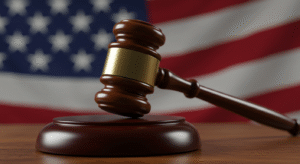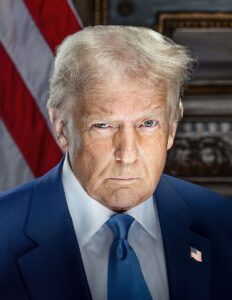Trump's Tariff Policy Blocked in Courts – Clash of US Separation of Powers
A strong ripple has once again struck the center of American politics and economy. The tariff policy that President Donald Trump has been pushing hard since taking office has been put on hold by a U.S. court. In particular, President Trump **International Emergency Economic Powers Act (IEEPA)** With the ruling that the tariff measures arbitrarily imposed based on this were unconstitutional, the question of whether the executive branch abused its power and the checks and balances of the legislature have once again come into question.

This ruling goes beyond simple trade issues and is a matter of the U.S. Constitution's guarantees. The principle of separation of powers, which is interpreted as a legal and political confrontation over the boundaries of authority between the legislative and executive branches. What kind of impact will this ruling have on future U.S. trade policy and the global economy?
index
-
- Trump's Tariff Policy: What's Wrong?
- What does the International Trade Court's ruling mean?
- Executive vs. Legislative: Conflict of Powers
- How far will the economic impact extend?
- Countries cheer Trump tariffs invalidation ruling
- Are Korean Companies Breathing Clear? - Response from the Export Industry to the US
- What's Trump's next move?
1. What was wrong with Trump’s tariff policy?
President Donald Trump has taken a more aggressive approach to trade policy than any other president, using his presidential power to impose massive tariffs on China, Mexico, the European Union, and even traditional allies. These policies have often been justified under the guise of “America First” and have been supported by the argument that they will protect domestic industries and jobs.
But the problem was the **legal basis for imposing tariffs**. Trump was International Emergency Economic Powers Act (IEEPA)By using the IEEPA, high tariffs were imposed on certain imported goods on the grounds that they were a threat to national security. However, the IEEPA was originally designed as an **emergency measure to counter external threats** through means such as economic sanctions or asset freezes. There has been consistent criticism that using it as a general trade adjustment tool is an excessive interpretation.
In particular, the core controversy in this case was that the administration **imposed tariffs independently without congressional approval**. According to the Constitution, the authority over trade lies with Congress, and the president’s authority should only operate limitedly below it. Trump exercised IEEPA authority only by declaring a “national emergency,” but the **Court on International Trade (CIT)** ruled that this was an “excessive act that infringed on legislative power.”
In addition, the problematic tariffs were criticized for being implemented suddenly **without economic clarity**. The industry suffered from management uncertainty due to the tax rates that changed without notice, and some companies suffered huge losses in the process of switching their supply chains from overseas to domestic. In the end, there was even criticism that Trump's tariff policy was not a simple trade tool, but **political weaponization** that caused legal and economic shocks at home and abroad.
The international community has also raised its voice in concern. Trade friction with allies has weakened the negotiating power and led to a decline in the credibility of the United States. Considering that the misuse of IEEPA is not simply a problem of domestic law, but also has an impact on the global trade order, this court ruling is not simply a correction of administrative procedures, but rather a **turning point in the United States trade policy**.
2. What does the International Trade Court’s decision mean?
The U.S. International Trade Court recently ruled that the tariffs President Trump unilaterally imposed under the International Emergency Economic Powers Act (IEEPA) are unconstitutional. The reason is simple: under the Constitution, the power over trade lies with Congress, i.e., the legislative branch, and the executive branch cannot exceed it.
This ruling goes beyond simply canceling a single tariff measure, and sends a significant message to the balance of power in the United States. It puts the brakes on the president’s exercise of his omnipotent powers under the pretext of a “state of emergency.” The court has drawn a line on the excessive exercise of power by the executive branch and reemphasized the authority of the legislative branch.
3. Executive vs. Legislative: Conflict of Powers
This case needs to be interpreted not as a simple legal dispute over tariff measures, but in the larger context of a conflict of powers between the executive and legislative branches.
The U.S. Constitution clearly stipulates the separation of powers between the executive (the president), legislative (Congress), and judicial (the courts). However, since taking office, President Trump has actively used ‘executive orders’ to circumvent the legislative process, and as a result, many policies have become embroiled in legal controversy.
This ruling reaffirms the principle that “the president’s power must be limited” in a series of such trends. In particular, criticism that imposing tariffs without going through Congress ignores “democratic procedures” is gaining traction.
4. How far will the economic impact extend?
This ruling could have an immediate impact on the economy. The biggest change is the reduction in import costs due to the removal of tariffs. In particular, American companies that import intermediate goods or consumer goods to produce products can expect cost savings.
There is also a possibility that tensions with countries that have been in trade friction with the United States will be somewhat alleviated. Through this ruling, the international community has confirmed that 'even the United States cannot reign above the law', and this could also serve as a positive signal for stabilizing the global trade order.
However, on the contrary, some of Trump’s supporters are opposing the court’s ruling, viewing it as a “political decision.” If the frame is formed that “the judiciary blocked measures to protect the American economy,” political conflict could actually expand.
5. Countries that cheered Trump’s tariff invalidation ruling
The news of the International Trade Court’s ruling has had a huge impact on many countries and economies around the world. In particular, the fact that the tariffs unilaterally imposed by the Trump administration have been lifted is being seen as a positive signal for trade liberalization and international cooperation.
first, European Union (EU)The EU Commission welcomed the ruling. The EU Commission said that tariffs violate trade norms and that the decision would be an important step toward restoring fairness and the rule of law in the international trade system. Many European countries’ industries and exporters are also optimistic about the possibility of easing the United States’ unpredictable trade policies.
Second, Canada and MexicoThe two countries also welcomed the ruling, predicting that it would have a positive impact on creating a fair trade environment within the North American Free Trade Agreement (USMCA). The two governments expect that if the U.S. trade policy stabilizes, it will be possible to strengthen economic cooperation and activate trade.
Third, Asian countries This ruling is also drawing attention. China and Japan are hoping that the trade tensions that have been aggravated by the unilateral imposition of tariffs by the United States will be alleviated, and they believe that this will help restore stability in the global supply chain and expand trade. In particular, China expects that this ruling will contribute to strengthening World Trade Organization (WTO) rules and restoring fairness in trade negotiations with the United States.
Fourth, World Trade Organization (WTO) officialsThe ruling will serve as a case to reaffirm the importance of complying with global trade rules, the court said. It is expected to have a positive effect in that it limits the US from pursuing trade policies beyond the executive branch’s authority, making it clear that legal procedures and congressional approval procedures must be followed within the international trade system.
Overall, this ruling is expected to have a positive impact on resolving trade disputes and strengthening the rule of law not only in the United States but also in the international community, and will serve as an opportunity for the global economy to move in a more transparent and predictable direction.
6. Are Korean companies breathing easier? - Response from the export industry to the US
The news of the International Trade Court’s ruling has had a big impact on the Korean export industry to the U.S., as the high tariffs imposed by the Trump administration over the past few years have been a huge burden to Korean companies.
First, the automobile industry is receiving the most attention. The United States has imposed high tariffs on Korean automobiles and parts, limiting market access. If the tariffs are lifted through this ruling, Korean automobile companies will be able to significantly restore their price competitiveness in the U.S. market. Large automobile manufacturers such as Hyundai Motor Company and Kia Motors expect that this will allow them to expand sales in the U.S. and recover their market share.
The electronics industry is also expected to see a windfall. Samsung Electronics and LG Electronics have been affected by their production base operations in the United States, but if this ruling is implemented, export costs will decrease, creating an environment favorable for securing competitiveness. In particular, it is expected that price competitiveness will be strengthened in the smartphone, TV, and home appliance sectors.
Small and medium-sized enterprises are also placing high expectations on this ruling. Exporting small and medium-sized enterprises that have had difficulty entering the U.S. market due to high tariffs and uncertain trade environment expect that the tariff withdrawal will reduce their burden and lower market entry barriers. This is likely to increase the share of Korean products in the U.S. in various fields.
Trade experts warn that while this ruling will have the effect of reducing tariff burdens in the short term, there will still be volatility in the long term due to changes in trade negotiations and policies with the U.S. Therefore, they advise that Korean companies should focus more on strategic responses and risk management to strengthen their competitiveness in the U.S. market based on this ruling.
In addition, the government also positively evaluates this ruling and is striving to maintain close cooperation and communication channels with the United States. The Ministry of Trade, Industry and Energy plans to use this ruling as an opportunity to reduce trade uncertainty with the United States and strengthen policies to support overseas expansion of Korean companies.
In conclusion, this ruling by the International Trade Court is likely to be an important turning point that will provide a breath of fresh air to the Korean export industry, and we can expect positive ripple effects on the domestic economy as well.
7. What is Trump's next move?

President Trump expressed strong dissatisfaction with this ruling, calling it “an attempt to weaken America.” And he hinted at the possibility of an appeal.
In reality, tariffs are lifted by court order.
But politically, it is likely to be used as leverage to strengthen the image of “me standing up to Washington politics.”
He also strengthens the tariff authority of the legislature, but Trump's tariff policy is currently in conflict with the principle of separation of powers in the United States and is blocked in the courts. Instead of strengthening the tariff authority of the legislature, US President Trump may choose to fine-tune his executive orders or take a roundabout strategy through revision of trade agreements. It seems that he will strengthen his message strategy to maintain his image as a 'strong president' ahead of the presidential election. , he may choose to fine-tune his executive orders or take a roundabout strategy through revision of trade agreements. Above all, it seems that he will strengthen his message strategy to maintain his image as a 'strong president' ahead of the presidential election.
summation
-
The U.S. Court of International Trade has ruled that tariffs imposed by President Trump under the International Emergency Economic Powers Act (IEEPA) are unconstitutional and ordered their withdrawal.
-
This ruling highlights the issue of conflict of power between the executive and legislature, and has a major impact on many countries and Korean companies.
-
The Trump administration is seeking a response to this ruling, and export industries around the world and Korea are paying close attention to this ruling.
*2025 World Economic Depression.. Article Go see
